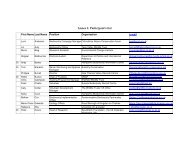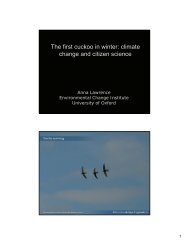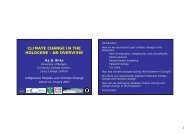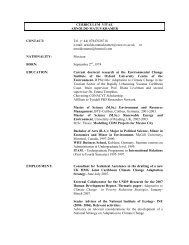ECI Annual Review 2006/2007 - Environmental Change Institute ...
ECI Annual Review 2006/2007 - Environmental Change Institute ...
ECI Annual Review 2006/2007 - Environmental Change Institute ...
Create successful ePaper yourself
Turn your PDF publications into a flip-book with our unique Google optimized e-Paper software.
Prof Maria carmen-lemos<br />
Maria Carmen Lemos is an Associate<br />
Professor at the University of Michigan’s<br />
School of Natural Resources and Environment<br />
where the overall focus of her<br />
research is the intersection of technoscientific<br />
knowledge and governance of<br />
environmental issues. During her sabbatical<br />
at <strong>ECI</strong> she investigated the role<br />
of governance institutions in building<br />
adaptive capacity to climate variability<br />
and change in water management in<br />
Brazil. Using survey data from eighteen<br />
river basin committees and consortia<br />
across different regions, she explores<br />
the implications of the use of technoscientific<br />
knowledge, including climate<br />
information, to foster adaptation and<br />
democracy in the management of vulnerable<br />
water resources.<br />
Eakin, H. and M.C. Lemos (<strong>2006</strong>).<br />
Adaptation and the state: Latin America and<br />
the challenge of capacity-building under<br />
globalization. Global <strong>Environmental</strong> <strong>Change</strong>,<br />
vol. 16, no. 1, pp. 7-18.<br />
Dr Dave frame<br />
Dave is looking at how uncertainties in<br />
predictions of global climate change<br />
models can affect climate policy, and<br />
the role of ‘ensemble’ climate forecasts<br />
and what they might imply. He is<br />
interested in how understanding recent<br />
and future global warming rates might<br />
improve the questions policy makers<br />
ask, as well as working on ways of<br />
understanding the uncertainties in the<br />
answers to those questions. He is also<br />
interested in philosophical aspects of<br />
climate research, especially questions<br />
regarding foundational issues in climate<br />
modelling. Formerly Dave was the coordinator<br />
of climateprediction.net,<br />
the world’s largest participatory<br />
computer climate model, with 1/4million<br />
contributors from over 150 countries.<br />
Frame D. J., Stone D. A., Stott P. A., Allen<br />
M. R. (<strong>2006</strong>) Alternatives to stabilisation<br />
scenarios, Geophysical Letters 33 L14707.<br />
Dr Cameron hepburn<br />
Cameron is an environmental economist<br />
specialising in climate policy and longterm<br />
decision-making. He has recently<br />
been working on the functioning of the<br />
European emissions trading scheme,<br />
instrument choice, adaptation finance,<br />
and the absence of a clear carbon<br />
price signal for business post-Kyoto<br />
2012. He assisted the UK Government’s<br />
Stern <strong>Review</strong> on the Economics of<br />
Climate <strong>Change</strong> and is advising OECD<br />
governments on their discounting<br />
frameworks, which determine how a<br />
balance is struck between short-term<br />
and long-term public objectives. He is<br />
a member of the Academic Panel for<br />
the UK Government’s Department of<br />
Environment, Food, and Rural Affairs<br />
(DEFRA).<br />
Hepburn, C., Neuhoff, K., Grubb, M.,<br />
Matthes, F. and Tse, M. (<strong>2006</strong>) Auctioning of<br />
EU ETS Phase II allowances: why and how?<br />
Climate Policy 6:1, 137-160.<br />
Dr samuel randalls<br />
Sam’s research analyzes the nascent<br />
weather derivatives market in relation<br />
to contemporary themes in climate<br />
policy. Can weather derivatives be<br />
used to adapt to the costs of climate<br />
change? How might weather derivatives<br />
interact with the EU emissions trading<br />
scheme and renewable energy<br />
financing? These questions are<br />
explored through empirical research<br />
on weather derivatives examining<br />
both the financial and meteorological<br />
networks underpinning the market. This<br />
work is informed through theoretical<br />
approaches developed in human<br />
geography and the sociology of<br />
science.<br />
Prof Timmons Roberts<br />
While on sabbatical at the <strong>ECI</strong>, Timmons<br />
is researching foreign aid and climate<br />
change mitigation and adaptation in developing<br />
nations. With special funds now<br />
for adaptation and huge carbon trading<br />
activities, the role of aid has been<br />
under-studied. His project will consider<br />
past aid and its impact on carbon emissions;<br />
effectiveness of 1,600 specific<br />
climate change aid projects; and case<br />
studies of China, Brazil, and India. This<br />
work builds on his book Greening Aid?<br />
Understanding Foreign Assistance for<br />
the Environment, analysing 430,000<br />
aid projects between 1970 and 2001.<br />
Timmons uses political economy theory<br />
to explain unequal suffering by poor<br />
nations of climate change impacts, unequal<br />
responsibility for the problem, and<br />
unequal participation in treaties such as<br />
the Kyoto Protocol.<br />
Roberts, J.T. and Hite, A., <strong>2006</strong>. The Globalization<br />
and Development Reader: Perspectives<br />
on Development and Social <strong>Change</strong> (Second<br />
Edition). Blackwell Publishers.<br />
prof john schellnhuber<br />
John is Founding Director of the<br />
Potsdam <strong>Institute</strong> for Climate Impacts<br />
Research and a Distinguished Science<br />
Adviser and former Research Director<br />
of the UK’s Tyndall Centre for Climate<br />
<strong>Change</strong> Research. He has recently been<br />
appointed as the ‘Chief Sustainability<br />
Scientist’ for the German Government<br />
in the <strong>2007</strong> G8/EU twin presidency<br />
and the overall post-Kyoto process.<br />
His research has advanced crossdisciplinary<br />
understanding of the crucial<br />
processes involved in climate change.<br />
He has contributed more than 230<br />
pertinent articles and books and was,<br />
for instance, Coordinating Lead Author<br />
of the WG II synthesis chapter in the<br />
Third Intergovernmental Panel on Climate<br />
<strong>Change</strong> (IPCC) Assessment Report. He<br />
received an honorary CBE in recognition<br />
of his accomplishments in climate<br />
change science and diplomacy, and<br />
he is an elected member of a number<br />
of learned societies (including the US<br />
National Academy of Sciences and the<br />
German Max Planck Society). Oxford<br />
now provides his UK base when not in<br />
Germany.<br />
Avoiding Dangerous Climate <strong>Change</strong>, <strong>2006</strong>.<br />
Edited by Hans Joachim Schellnhuber, Wolfgang<br />
Cramer, Nebojsa Nakicenovic, Tom Wigley,<br />
Gary Yohe. Foreword by Rt Hon Tony Blair<br />
MP, Introduction by Dr Rajendra Pachauri.<br />
Dr Emma Tompkins<br />
Emma researches how societies can<br />
and should adapt to climate change.<br />
Her current projects include societal<br />
responses to natural hazards as an<br />
analogy for preparing for climate<br />
change; processes of institutional<br />
learning and the role of international<br />
conventions; drivers of private sector<br />
responses to weather hazards; and<br />
motivators of individual change. She<br />
is focusing on 4 themes: knowledge<br />
transfer across social groups and<br />
cultural contexts; tools to support<br />
climate change decision making; the<br />
role of governance in enabling and<br />
constraining climate change responses;<br />
and identifying the psychological and<br />
economic limits to adaptation. With<br />
colleagues from the Caribbean she<br />
recently wrote a manual on ‘Surviving<br />
climate change in small islands; a<br />
guidebook‘.<br />
Tompkins, E. L. 2005. Planning for climate<br />
change in small islands: Insights from<br />
national hurricane preparedness in the<br />
Cayman Islands. Global <strong>Environmental</strong><br />
<strong>Change</strong> 15 (2):139-143.<br />
1






